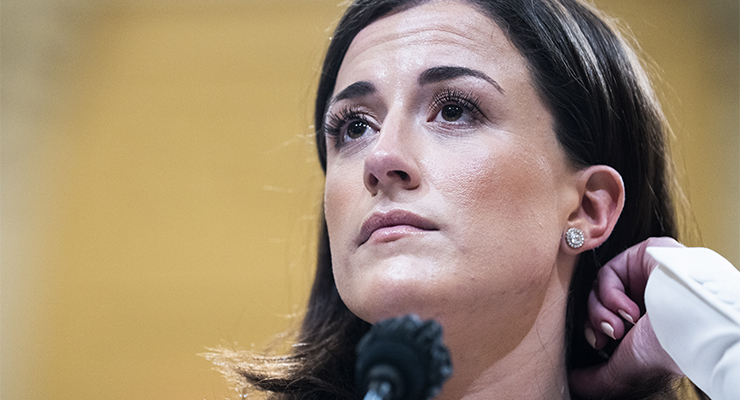
The ninth — and potentially final — public hearing of the Select Committee to Investigate the January 6 attack on the US Capitol has wrapped with a unanimous vote to subpoena former president Donald Trump to testify.
While Trump ponders how to play his cards — thus far he’s called the committee a “total BUST that has only served to further divide our country” — Crikey takes stock of the most powerful moments from public hearings past.
June 9
The opening hearing was dominated by behind-the-scenes footage from January 6 and video testimonies from (no longer) loyal Trump aides, including his daughter Ivanka. Collectively, it put Trump squarely at the centre of the plot to overrun the Capitol and overturn the 2020 election results. Former attorney-general William Barr was blunt in his testimony: he told Trump that claims of election fraud were “bullshit”.
Committee vice chair Liz Cheney — one of only two Republicans on the bipartisan committee — implored her colleagues to consider their allegiances:
“Tonight, I say this to my Republican colleagues who are defending the indefensible. There will come a day when Donald Trump is gone, but your dishonour will remain.”
June 13
This hearing served as a post-election reality check, during which it was determined that Trump was “detached from reality”. Testimony from Trump campaign advisers and lawyers detailed how the former president went off the truth and anyone who tried to peddle it, turning instead to the three controversial figures prepared to indulge his conspiracy theories: lawyer Rudy Giuliani, attorney Sidney Powell and former trade adviser Peter Navarro. It was also revealed that Giuliani was “definitely intoxicated” when he told Trump to declare victory on election night.
June 16
The committee found Trump’s prior right-hand man, former vice president Mike Pence, was under immense pressure from the top to overturn the election. A point Trump made no secret of. Before and after the riots, he publicly tweeted about Pence’s failure to do his job: “Pence didn’t have the courage to do what should have been done.” In private, Trump was said to have called Pence a “wimp” without “courage”.
The committee also heard about Pence’s refusal to flee despite calls from protesters to “hang Mike Pence”, threats to “drag motherfuckers through the streets” should Pence certify the election, and a Proud Boy declaration that the group “would have killed Mike Pence if given the chance”.
June 21
Turns out Rudy Giuliani was upfront about the lack of evidence supporting Trump’s claims of election fraud. Speaker of Arizona’s House of Representatives Rusty Bowers testified that Giuliani told an official: “We have lots of theories, we just don’t have the evidence.” Whether a “gaffe” or not, Bowers likened the “tragic parody” to The Gang That Couldn’t Shoot Straight, a novel of collective criminal ineptitude.
A number of election officials — of both political stripes — also testified about how their lives had been turned “upside down” by their refusal to shirk the system and comply with Trump’s calls to overturn the election.
June 23
Voting machines were part and parcel of Trump’s plan to overturn the election. The committee heard about Trump’s December 16 2020 draft executive order for the military to seize voting machines. Although not issued — there was “no legal authority” to do so — it served as a damning indictment on Trump’s repeated requests for the Department of Justice to investigate election conspiracy theories. Former acting attorney general Jeffrey Rosen told the panel: “We had seen nothing improper with regard to the voting machines, and I told him that the real experts had briefed us, that they had looked at it and that there was nothing wrong with the voting machines.”
June 28
Former White House aide Cassidy Hutchinson (who went into hiding following her comments) gave explosive testimony, telling the committee that Trump sought to lead the Capitol mob but was stopped by the Secret Service. She also revealed Trump was told beforehand that many of the protesters who arrived for his Stop The Steal rally that day — which would be the springboard for the assault on the Capitol — were armed. He didn’t care — they weren’t there to hurt him, he said; let them come in.








I am enjoying reading witness reports of how furious he was on election night when it was obvious he’d lost. It must continue to eat away at him despite his irrepressible bravado.
It’s almost comical watching Trump cheer-leaders and enablers, the likes of Barr – who used to frolic with Trump in their contrariness and thumbing their nose at accepted mores – now trying to distance themselves from him, as if expecting they can.
Given that so far Trump and other senior Republicans have only been investigated, and only up to a point, while all those put on trial so far are comparitively small fry, the Republican coup and its leadership remains intact and is progressing. So these hearings chiefly serve to tell the conspirators where they went wrong in 2020, and will be very useful to them for their next attempt to seize power. For example, the importance of stacking electoral boards with sympathetic personnel who will not defend the electoral process is made very clear, along with the effectiveness of intimidation of those who resist. After the mid-terms the seditionists should have sufficient control in Congress to disrupt or derail any further attempts to use the law against them. Putting a stop to prosecutions by state prosecutors is of course not so easy, but ways of intimidating and strong-arming those states will be found.
The Biden administration has largely followed a business-as-usual approach rather than recognising the extent of the threat and the emergency it presents. It has failed in the past two years to take the required drastic measures to defend the constitution and the results are probably fatal to the USA in its current form.
If things ever get that bad it is quite likely that the armed services will step in to restore order and protect the constitution. There was a whiff of it here in our army when Whitlam was booted out.
Maybe, and maybe not. There are countries where the armed forces routinely involve themselves in politics. There are others where the culture of the armed forces is very strongly against any direct or open involvement and the senior commanders take great pride in showing due deference to the civil authority. The USA and the UK are two examples of the latter. So is Germany, as was amply demonstrated when its generals refused to intervene in any way during the 1930s although they mostly deprecated what was happening in Germany then. No doubt everyone is glad those generals behaved so correctly.
It’s also notable that large sections of the US armed forces, though not necessarily the senior officers, appear to be more sympathetic to the seditionists than the elected government. How that would play out if the officers tried to move against a coup is anybody’s guess.
The only ‘whiff’ aka stench of that in 1975 was amonst some of the brass, the greater amonst those with the shiniest pants bottoms.
They were quickly disabused of such Boy’s Own Adventure fantasies by the NCOs who reported that it was a non-starter – the troops would have none of it.
I’ve just seen a similar, but longer and better version of the above argument on the Slate website by Dahlia Lithwick: “Ending the Jan. 6 Hearings with a Trump Subpoena Was a Mistake”.
There are already legislative changes in the wind should Trump or a similar figure win. The aim is to politicize ordinary federal public servants.
I notice that someone down voted my comment which made me realise I should have provided further info. Here’s an Axios article about the possibility of Schedule F plans – https://www.axios.com/2022/07/22/trump-presidency-schedule-f-federal-employees
Trump should have been prosecuted by now. This would have taken him out of the running for 2024. A golden opportunity was lost.